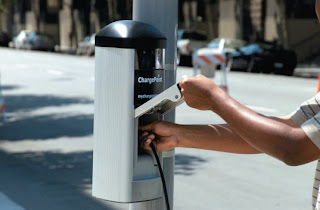The State of California already has Better Place, Solar City, and Coulomb Technologies competing to provide residents with an electric vehicle charging station network. So far, however, Coulomb Technologies is the only firm of the three to explicitly provide resources to form partnerships with local governments, for both city planners and fleet managers. Coulomb has provided distinct resources for each set of stakeholders in the process, a key concern that has not received enough attention in earlier enterprises. Coulomb has begun to operate electric vehicle charging stations in San Jose, CA, out of streetlamps. With fierce competition coming from Better Place and Solar City, it should be interesting to see which of these firms has the most successful implementation of electric charging grids. As California is the nation's largest commercial market, success here means a great deal of transferrability to other regions and will attract significant international attention as well.
Currently (as of March 2010) Evergreen Fleets remains the only regional Green Fleets certification regime in the United States to follow the conceptual model of LEED, with set benchmarks for emissions reduction and alternative fuel investment. Evergreen Fleets is a pilot project of the Puget Sound Clean Cities Coalition, one of over 70 similar programs in metro areas throughout the US that are administered by the US Department of Energy's Clean Cities Program. However, due to limited national and state funding, similar programs are difficult to coordinate and maintain in many areas. Evergreen Fleets, for instance, has no full-time staff or even a dedicated office, like the LEED program. Important national initiatives like Obama's stimulus package are an important first step in spurring innovation, as their $200 million grant to Better Place has shown. Without adequate regulatory enforcement at the state and local, however, there is no guarantee that this investment is publicly accountable or even financially sound.
Further, while it is true that the venture capital and startup sectors have far more innovative capacity to offer in terms of green fleet solutions than any public agency initiative, public agencies play an important role in shaping the commercial markets by their sheer size and visibility alone. By creating economies of scale, public agencies can make certain vehicle technologies more affordable (and therefore more successful) simply by increasing the demand for them.
Instead of blindly "recommending" that candidate agencies invest in electric vehicles and awarding points for those that do, Evergreen Fleets (and any certification regimes that emerge elsewhere) should specify in greater detail which applications of this technology are most appropriate and for whom.


No comments:
Post a Comment